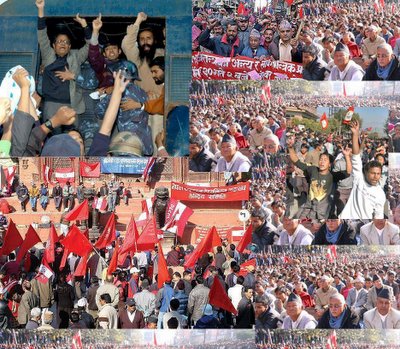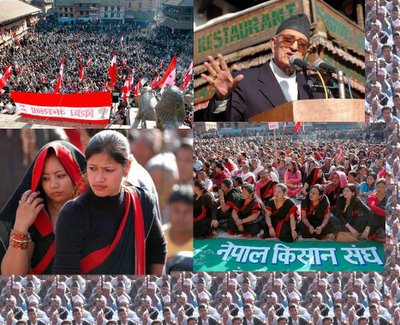

I got to talk to Girija Koirala earlier, not long back.
My first sentence to Bill Clinton was “Mr. President, you are Elvis.”
My first sentence to Girija Koirala was “To be able to talk to you feels like having entered a museum.” The entire time I was on the phone with him I kept thinking, this is the closest to BP Koirala I will ever get. BP Koirala has a place in Nepali history that no other political figures does, certainly no king. That is for sure. But Girija Koirala is more than BP Koirala’s brother. BP had more than one brother: none of them attained Girija’s stature, and there is a reason why.
Much is made of Girija never having gone to college, as in by US standards. Some of the legends in American business have been college dropouts: Bill Gates, Larry Ellison, Warren Buffett, Steve Jobs, to name a few. We call them borderline geniuses. Not that I am suggesting Girija is a genius, although at one point I wrote a satire comparing his House revival idea to Newton’s theory of gravitation, as in to suggest the House revival idea was holding everything down! (Newton, Apples, And Girija's House Revival Idea)
At some level Girija’s reach into his party the Nepali Congress might be even deeper than that of BP Koirala himself. BP was a visionary, an intellectual, a towering one on that. But he was not much of a nuts and bolts man. Politics is a contact sport. You have to deal with petty people. BP steered above that too much, too well. Also he was ahead of his times. So he did not get to enjoy power like he deserved to. BP is the biggest and the easiest reason I dislike Mahendra. Mahendra deprived Nepal of BP: that is his crime. If Nepal had been a democracy 1960 onwards, I think it would have emerged a small scale Asian tiger, economically speaking.
BP was unlucky in many ways. But there was one luck he had. BP once called Girija a “Hawaldar,” a police constable. In actuality, Girija was and is BP’s Hanuman. Girija’s devotion has been as much to the cause of democracy as to BP, and somewhere in there gets mixed the love of one brother for another. That is one powerful combination.
The Gandhi family in India did put decades into the fight for independence. But it also enjoyed almost four and more decades in power. The Koirala family, on the other hand, has largely been in the wilderness. And the founding father BP did not even get to taste it, not even one full term.
BP had a hard time coming to terms with Mahendra’s pettiness. You only have to compare Mahendra’s third grade poems to BP’s major novels to see the obvious difference between the two. A system that puts Mahendra onto the throne and throws BP into jail is so obviously wrong. It is not even worth debating. If BP would only have written his novels and done nothing else, he would still have found himself in the same class as people like Laxmi Prasad Devkota.
If Nepal ever gave birth to its proudest son, it was BP. Buddha and BP. What a ridiculous country that BP was mostly either in jail or in exile. Nepal turned BP into an orphan. Karna was disowned.
But Girija really is more than BP’s brother. Girija has been an organization man. He has this magical grip on his party. He generates this intense loyalty from his cadres. When you look at the 1990s, it is so obvious Girija outshined even when Krishna Prasad Bhattarai and Sher Bahadur Deuba became Prime Minister. Girija let them. But his Mps always maintained this fierce loyalty to him: it was almost animal. This man knows organization like few others in Nepali politics do. Yes, Girija has been capable of the petty. You wish BP had been. Maybe we would have had to see less of Mahendra.
At my blog I have been very critical of Girija. But it has always been a policy difference, not a personal dislike. Though I am not a Nepali Congress person, I am a Sadbhavana person. Social justice means to me what democracy means to Girija. And post-democracy there is going to be a healthy competition between the Nepali Congress and the Sadbhavana.
But then there is the ANTA, Association of Nepali Teraian in America. When it got founded, I got invited to hold some kind of a central office. I declined. I have been instrumental in launching the New York City and Baltimore-DC chapters of the ANTA. But I have refused to hold any official title with them. ANTA is a social, cultural organization. It is not politically hard core enough for me.
But Girija is. He is hard core. I identify with him. It is like the bond one soccer player might feel for another. I do have that for Girija. I feel that affinity.
Girija Koirala is a player.
I have been trying to get hold of his phone number for a while now. I sent out emails to people who had it. They did not email it to me. Access is power. I did not take all that too personally. But then I got to talk to Amik Sherchan yesterday. And towards the end of the conversation he asked me for my contact info. After I learned he was not into email, I proceeded to give him my phone number. Then I casually said I did have the numbers of five of the seven leaders. I did not have the numbers for Gopal Man Shrestha and Girija Koirala. Will he please give them to me? I knew he had them. He gave them to me, two numbers for Girija Babu.
The first two calls I placed, one got me a busy tone, the other phone did not get picked. This evening the call went through. Someone else picked the phone, some male. No, it was not Sujata.
I paid him my respects, and then requested a few minutes of his time for the few questions I had.
He first gave me a brief synposis of where he felt the movement was. He said the movement was now spreading all across the country. It was in Kathmandu, but now it was also in the districts. The goal was to boycott the February 8 polls, he said.
I asked him why he insisted that the 1999 House be revived.
He said it is important to seek continuity through the 1990 constitution that was an agreement between the people and the king. This was important for the history of the Nepali Congress. If the 1990 constitution is ditched so unceremoniously, that is like wiping out the entire history of the Congress. He said the House revival idea important for his party’s identity and history.
“They tried to erase our history in 2017 B.S.”
Nepal’s history started with Prithvi Narayan Shah, he said. The 1990 constitution is an important element of that continuity.
I said he and his party were already for a constituent assembly. That is like saying you are for a new constitution for the country. Is that not so?
He said that is true, but it is possible to go towards that new constitution through the old constitution.
I said what if instead we were to have an interim government like that of Kisunji’s in 1990 that will take the country towards a new constitution.
“But Kisunji’s interim government had the powers of the executive, the legislative, as well as the judiciary. If the king will agree to that, then of course, sure.”
So you are saying if such an interim government were possible, you will let go the House revival stand?
“Yes,” he said.
Let’s say this king is a ridiculous, nonsense person, and instead of the king coming around to the interim government, it is given birth to by a revolution.
“If it be through a revolution, why only an interim government,” Girija Babu said. “If a revolution were to take the country to a republic itself, why would I have any problems with that?”
“Ganatantra aye awos!”
Then I thanked him for his time. I said you are a busy man, I do not wish to take too much of your time.
“Jaya Nepal,” he said, ever the dutiful, loyal Nepali Congress soldier.
“Jaya Nepal,” I said to a man who is history himself talking.
I could not believe my ears at the end of it all. Girija sounded more reasonable and nuanced and flexible on the House revival stand than many of the other leaders in the seven party coalition who pretend to have been bullied into it by Girija.
Girija is not being obstinate. He is being practical. He does not have the luxury to get too ahead of the movement itself.
This talk with Girija Koirala also opens up doors and windows for me. I am going to keep calling the top dogs in the seven party coalition. I want to be part of the conversation as they take their 12 point agreement to the next step.
The country needs a fundamental bipolarization. First the seven parties and the Maoists have to come up with a program that they are both fully behind, and feel comfortable with. And the Citizens Movement for Democracy and Peace (CMDP) has to come around to accepting the leadership of the seven parties, to the idea of joint programs. Of the four projects we in the diaspora are involved with, two are to do with the CMDP, and two are to do with the seven party coalition. The idea is to bring those two forces together.
One pole, the king. Another, the seven parties, the Maoists, and the CMDP.
The external work has already been done. The king is isolated globally. He is a persona non grata on the world stage. He can be isolated even further, if need be. The bipolarization will also isolate him inside the country. He is going to have to do business or get out of the way.
This is not about Girija Koirala or Madhav Kumar Nepal, although they are important and indispensable vehicles. This is about the 27 million people of Nepal. This is about democracy. The Nepali people are too good not to have it. Not even kings can get in the way, especially kings.
Girija Babu, my salutes to you. You are a soldier of democracy. Please let go the House revival stand in exchange for the Maoists letting go of their army totally before the country goes through a constituent assembly. Let’s move straight for an interim government. When the revolution enters its peak, we can get that interim government on our own, with or without the king coming along to the idea. Nothing and nobody can erase your personal history, or the personal history of your brother, the Mahamanav BP Koirala, and most certainly not the history of the Nepali Congress. Your party gets major credit for the 1990 constitution which was most definitely a democratic constitution, no doubts about that. But now is the time and opportunity for your party to reinvent itself and lay major claim also to the next constitution this country will have. If you do it right, perhaps your broken party will reunite, perhaps the smaller parties will merge into your party, and perhaps your party will emerge the largest party all over again.
Your party has laid claim to democracy. It perhaps can also lay claim to social justice.
But it all really starts with your letting go the House revival stand. Enough waiting. Time for the next step. Let’s move straight towards an interim government of the seven parties.











